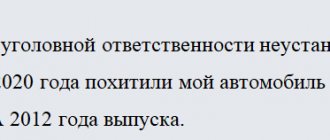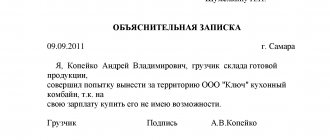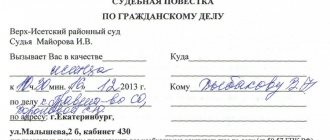How to protect yourself from charges of “insurance fraud” (Article 159.5 of the Criminal Code of the Russian Federation)
Lawyer Antonov A.P.
Another special type of fraud is insurance fraud. By analogy with the compounds discussed above, it is special solely because of the area in which thefts are committed, namely insurance relations. Chapter 48 of the Civil Code of the Russian Federation contains the concepts of an insured event, insurance compensation, insured, etc. According to Art. 927 of the Civil Code of the Russian Federation, insurance is carried out on the basis of property or personal insurance contracts concluded by a citizen or legal entity (policyholder) with an insurance organization (insurer). According to Art. 938 of the Civil Code of the Russian Federation, as insurers, insurance contracts can be concluded by legal entities that have permits (licenses) to carry out insurance of the corresponding type. The requirements that insurance organizations must meet, the procedure for licensing their activities and the supervision of these activities are determined by insurance laws. Insurance activities are regulated by the Law of the Russian Federation of November 27, 1992 N 4015-1 “On the organization of insurance business in the Russian Federation.” According to paragraph 2 of Art. 9 of this Law, an insured event is defined as an event that has occurred, provided for by an insurance contract or by law, upon the occurrence of which the insurer becomes obligated to make an insurance payment to the policyholder, the insured person, the beneficiary or other third parties. When it comes to insurance fraud, we mean situations of committing fraudulent actions by deceiving the occurrence of an insured event (for example, providing false information about the existence of circumstances confirming the occurrence of an insured event, namely staging an accident, car theft, etc. .) or the amount of insurance compensation to be paid (for example, if the insured event actually occurred, but knowingly false information about the amount of damage is provided). In essence, the so-called corporate insurance is no different from insurance for individuals, except that the insured is a legal entity. For example, LLC “R” has a car and a garage on its balance sheet, the risk of loss or damage of which is insured on the basis of an appropriate insurance contract. There is a fire in the garage, which you manage to put out on your own, but the car is not there at the time of the fire. The general director of R LLC, with the intent to steal funds from the insurance company, fakes the theft of a car, and also provides authorized employees with knowingly false information regarding fire-damaged property, which increases the amount of insurance compensation, when drawing up the report. As a result, the insurance company is provided with false information regarding the occurrence of an insured event (car theft) and the amount of insurance compensation (inaccurate information about damaged property). If in this case the general director of LLC “R” also contacts the police with a statement about the theft of a car, then his actions will be classified as a set of crimes, i.e. according to Art. Art. 159.5 and 306 of the Criminal Code of the Russian Federation (knowingly false denunciation of a crime). Advice: in order to avoid situations related to false suspicions of fraud in the insurance industry, when concluding insurance contracts, you should report the actual value of the property, without trying to inflate the value of the damaged property or exaggerate the damage in the event of an insured event. Otherwise, your actions may be regarded as intent to steal funds from the insurance company. As qualifying features of the crime under consideration, the legislator establishes the commission of these actions: - by a group of persons by prior conspiracy, as well as causing significant damage to a citizen; - by a person using his official position, as well as on a large scale; - by an organized group or on a particularly large scale.
Still have questions for your lawyer?
Ask them right now here, or call us by phone in Moscow +7 (499) 288-34-32 or in Samara +7 (846) 212-99-71 (24 hours a day), or come to our office for a consultation (by pre-registration)!
Subject of insurance fraud
The peculiarity of Article 159.5 of the Criminal Code is that various persons can act as the subject of a crime:
- Representatives of an insurance organization are employees working in an insurance company under an employment contract, or the immediate managers of the organization.
- policyholders are individuals who enter into an insurance contract or have the status of an insured by force of law. Policyholders make an appropriate insurance contribution to the insurer, which is a payment for the provision of services.
- insured persons are citizens in whose name the insurance contract is concluded.
- beneficiaries are citizens who have the right to count on receiving insurance payments upon the occurrence of an insured event.
All listed persons must meet the requirements of the Criminal Code for the subject of a crime: sanity and reaching the age of sixteen.
How to identify a fake OSAGO?
In order not to fall for the tricks of scammers, when purchasing an MTPL policy, you should pay attention to the following nuances:
- the original policy consists of two sheets;
- the front side of the policy is covered with a special micromesh;
- the reverse side of the policy form contains a metallized strip about 2 mm wide;
- all policy sheets are the same color;
- when viewing pages against the light, watermarks containing the RSA logo are displayed;
- the surface of the form has fluff to the touch;
- The policy number and series are printed in the form of raised numbers and letters.
As a rule, scammers use original policies from companies that have gone bankrupt long ago. To avoid falling into the hands of scammers, you must comply with the following conditions:
- To issue a policy, choose only trusted companies with a long history of work and positive customer reviews;
- the cost of insurance in almost all insurance companies is the same, so if you receive an offer to purchase a policy at a reduced cost, you should carefully study the conditions;
- After purchasing a policy, you should check it by number through the RSA website.
Compliance with these rules will help you avoid the risk of becoming victims of fraud in the insurance industry. If you have any doubts about the integrity of the insurer, you should contact law enforcement agencies.
Insurance fraud
One of the most common types of insurance fraud is the illegal handling of insurance policies. This is explained by the fact that the procedure for forging insurance is quite simple, if we add to this the provision of illegal assistance from traffic police officers.
CASCO policy
Despite the fact that the CASCO policy is not mandatory and not all car owners use it, it is of interest to criminals. The main illegal schemes applied to the CASCO policy include:
- Simulated car theft. The scheme may look like this: the owner of a car with a CASCO policy sells it to a third party for a small price, and later reports it stolen.
- Taking out a policy after an accident has occurred.
- Collusion with service station employees. The service station fills out information about repairs and components at inflated prices, after which they are transferred to the insurance company to receive the required payments.
- Re-enactment of a traffic accident. Along with the staging, a false protocol is drawn up, on the basis of which payment should be made under the CASCO policy.
It is difficult to describe all insurance fraud schemes, since each individual case is individual and has its own nuances. It is worth noting that there are quite a lot of such cases and every year new ways of illegal enrichment in the field of insurance services arise.
OSAGO policy
This type of insurance, due to its mandatory availability for every motorist, is common. This circumstance gives rise to new cases of policy fraud. As a rule, illegal schemes include the sale of fake or lost policies, as well as staging an accident, theft, etc.
When violating insurance laws, you should always think about the consequences.
Main types of fraud
In order to protect you from scammers, we will consider what types of fraud are actively developing in the market and what you need to beware of.
Fraud by insurance companies and their employees
The simplest fraud that has appeared since compulsory insurance and is not developed today on a large scale is scams by insurance companies or individual employees.
Common types of fraud:
- Issuing a policy retroactively. This is relevant in the case when a client without compulsory motor liability insurance comes to us and has had an accident. For a lucrative fee, insurers issue policies retroactively. However, recently such fraud is extremely difficult to do, since all policies are checked and registered with the RSA. Only handwritten agents can issue such contracts.
- Increasing the amount of damage or adding damage. By collusion, employees of the loss adjustment department record non-existent damages. After receiving the payment, the client, as a rule, gives the employee 50% of the money received for the “drawn” damage. This benefit is good both for the insurance specialist and for the client himself, who receives increased compensation.
- Selling fake MTPL policies or other frauds through which you can make money. For example, many companies charge a separate fixed fee for the form itself, in the amount of 100-300 rubles, without providing any receipts. There are also insurers who, for a similar fee, sell Europrotocol, which is issued completely free of charge.
Fraud by the insured themselves
As for the policyholders, over time they also learned to make profits illegally, from the insurance company. At the same time, they have no less opportunities than insurance representatives.
Ordinary drivers make a profit as follows:
- Fake policy. A new fraud scheme with the MTPL policy was discovered only after the emergence of electronic insurance. Motorists printed the form on a color copy and provided it to the traffic police officer. This allowed us to avoid a fine. As for the accident, the at-fault party with such a policy also received payment on a legal basis, since it contacted the company of the at-fault party.
- Staging damage. At least two cars take part in such a scheme. At the same time, scammers make an accident once and record the case in order to receive payment from all companies (in turn). To receive compensation, policies are purchased from several companies at once.
Fraud involving third parties
Unfortunately, frauds often involve third parties who, at first glance, have nothing to do with making a profit. However, such scams do occur in the financial services market.
Accomplices are:
- When an insured event is initiated. It is the traffic police officers who agree to draw up a protocol for a fee. Moreover, they do this without the scene of accidents and inspection of cars. All the necessary information is provided by the scammers.
- Fraud in examination. Before making a payment, the car is sent to an expert, who inspects it and announces the amount to be paid. It is here that for an attractive reward the amount can be increased by 20-30%.
This type of fraud is extremely difficult to detect, since insurance officers, traffic police officers and policyholders work together in collusion.
Fraud with electronic insurance policies
A new type of fraud in MTPL is associated specifically with electronic contracts. This is not about selling fake insurance. The policyholders themselves began to engage in fraud. The essence of the deception is that when purchasing protection, the car owner indicates the registration address in the region or village and the calculation is based on a minimum coefficient of 0.6 or 0.7.
This allows you to save money and get a real form on favorable terms. For example, the territorial indicator for Moscow is 2. It turns out that the client can save more than half the cost.
However, drivers do not take into account one point. When an accident occurs and a loss is registered, a package of documents is accepted and it is looked at how the calculation was made. In such a situation, you can not only lose your payment, but also receive a punishment or fine for fraud in the insurance policy.
The problem of fraud in OSAGO in Russia
Fraud is a big problem that is actively developing in the insurance market. As a result of its development, car owners began to distrust insurers, as a result of which the insurance market began to develop more slowly.
At the same time, it is important to understand that if previously fraud under compulsory motor liability insurance was associated in most cases with payments, today it is with the sale of policies via the Internet.
Important! As for payment fraud, according to RSA data for 2014-15, the amount of transfers amounted to 211.08 billion rubles. At the same time, about 15% of this amount went into the hands of fraudsters who provoked an accident in order to receive payment or did not get into an emergency situation at all.
As a result of fraud, many insurers are forced to:
- raise insurance rates;
- withdraw from the market or refuse a mandatory product;
- push additional products to cover costs and stay in the market.
The problem of fraud is so global because it is as a result of it that many market participants cannot receive the planned profit.
However, not only insurers suffer, but also ordinary clients. By purchasing a fake policy, they deprive themselves of the financial protection that is guaranteed to every victim of an accident. Unfortunately, such drivers will have to compensate for all losses themselves.
Important! In 2014-15, law enforcement officials and the RSA identified about 450 attempts to illegally obtain compensation for insurance claims in the amount of 30 million rubles. As a result, 63 criminal cases were initiated, 17 of which were sentenced and sentenced.
What is the responsibility
Of course, the state maintains strict control in order to identify facts of fraud. At the same time, there is a penalty for each type of scam.
Penalties:
- In accordance with Article 159 of the Criminal Code of the Russian Federation, for fraud (scams in the insurance market) an administrative address is provided for up to 4 months, a fine of up to 500 thousand rubles or imprisonment for up to 4 years.
- If the scam resulted in a bribe, then the punishment is provided for in Article 204 of the Criminal Code of the Russian Federation. In this case, the law provides for arrest for up to 6 months, a fine of up to 2,500,000 rubles, or imprisonment for up to 5 years.
- The punishment for falsifying documents is prescribed in Article 327 of the Criminal Code of the Russian Federation. In this case, arrest is provided for a period of 6 months to 3 years.
Important! According to the law, for causing a loss, the culprit will not only have to be punished, but also compensate for all expenses in full.






